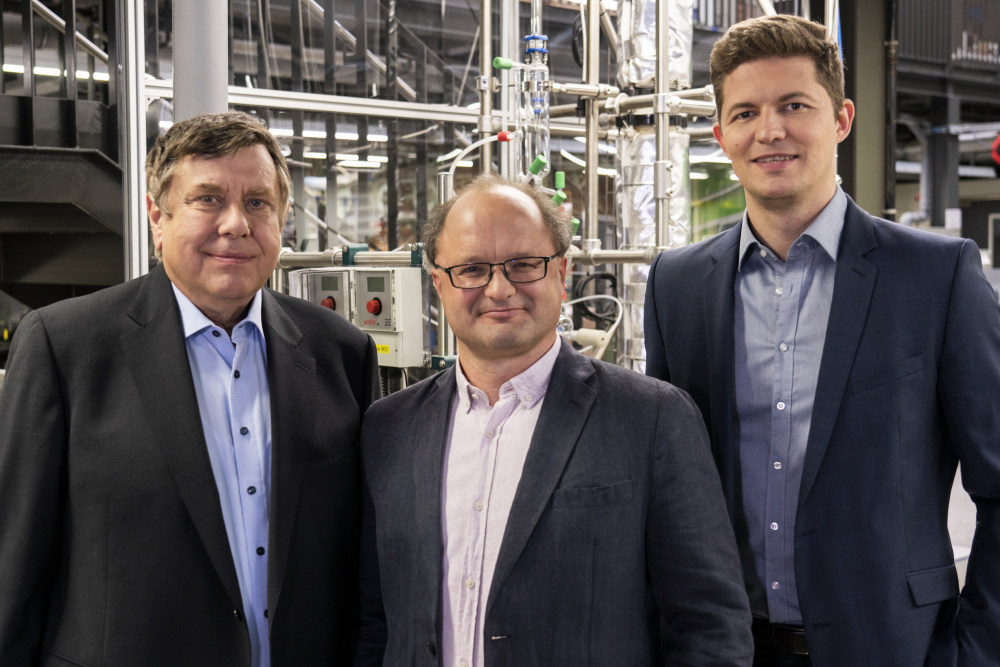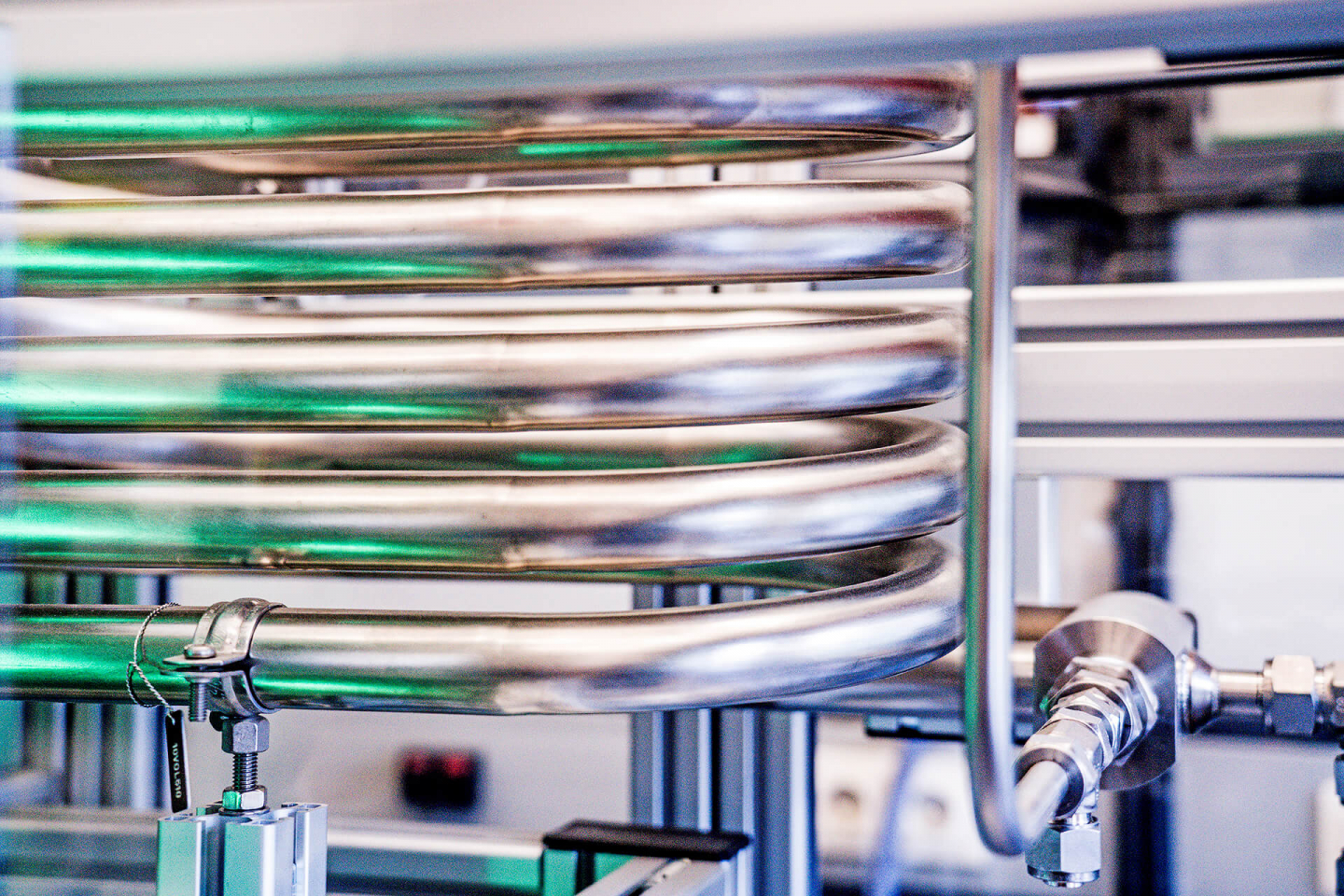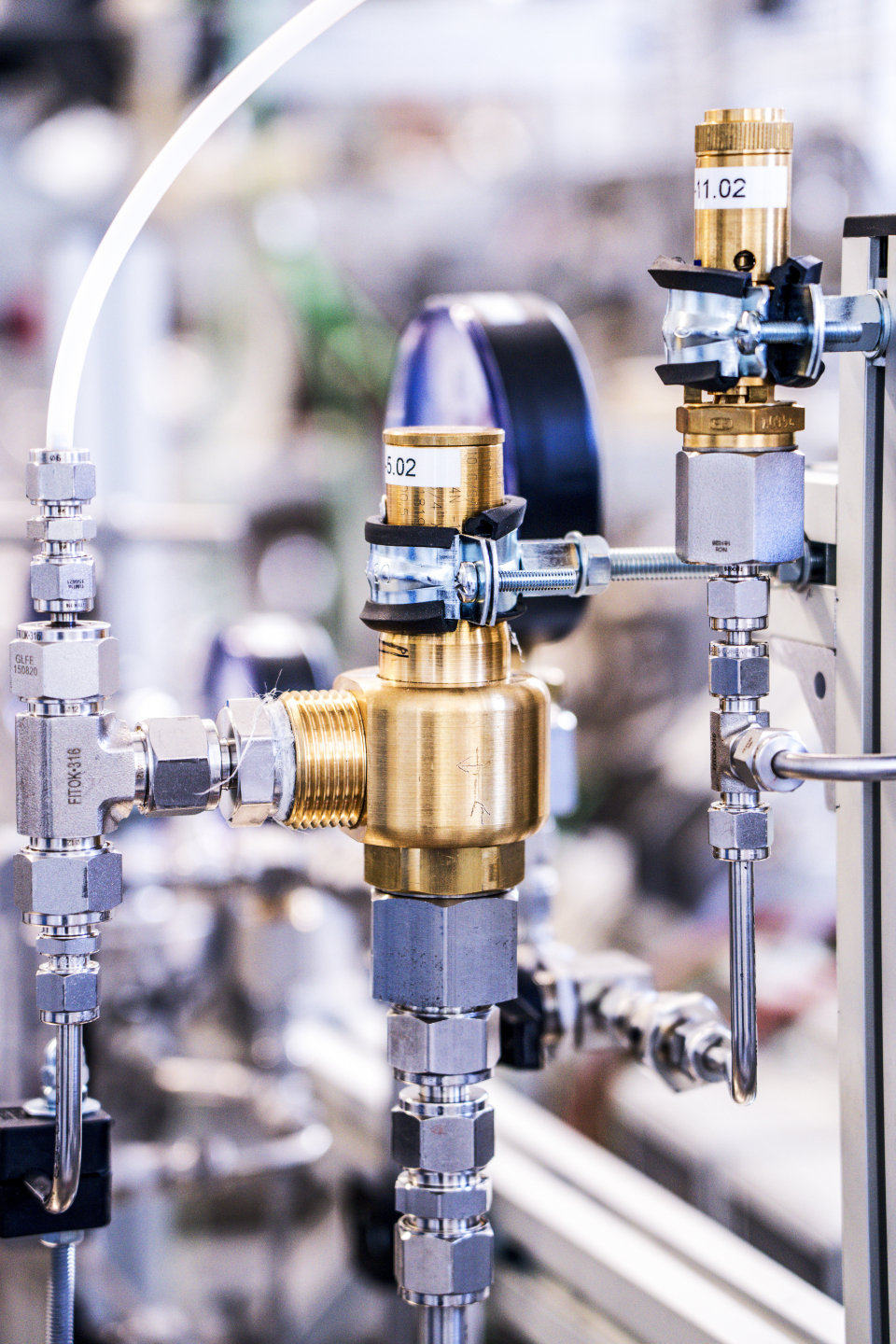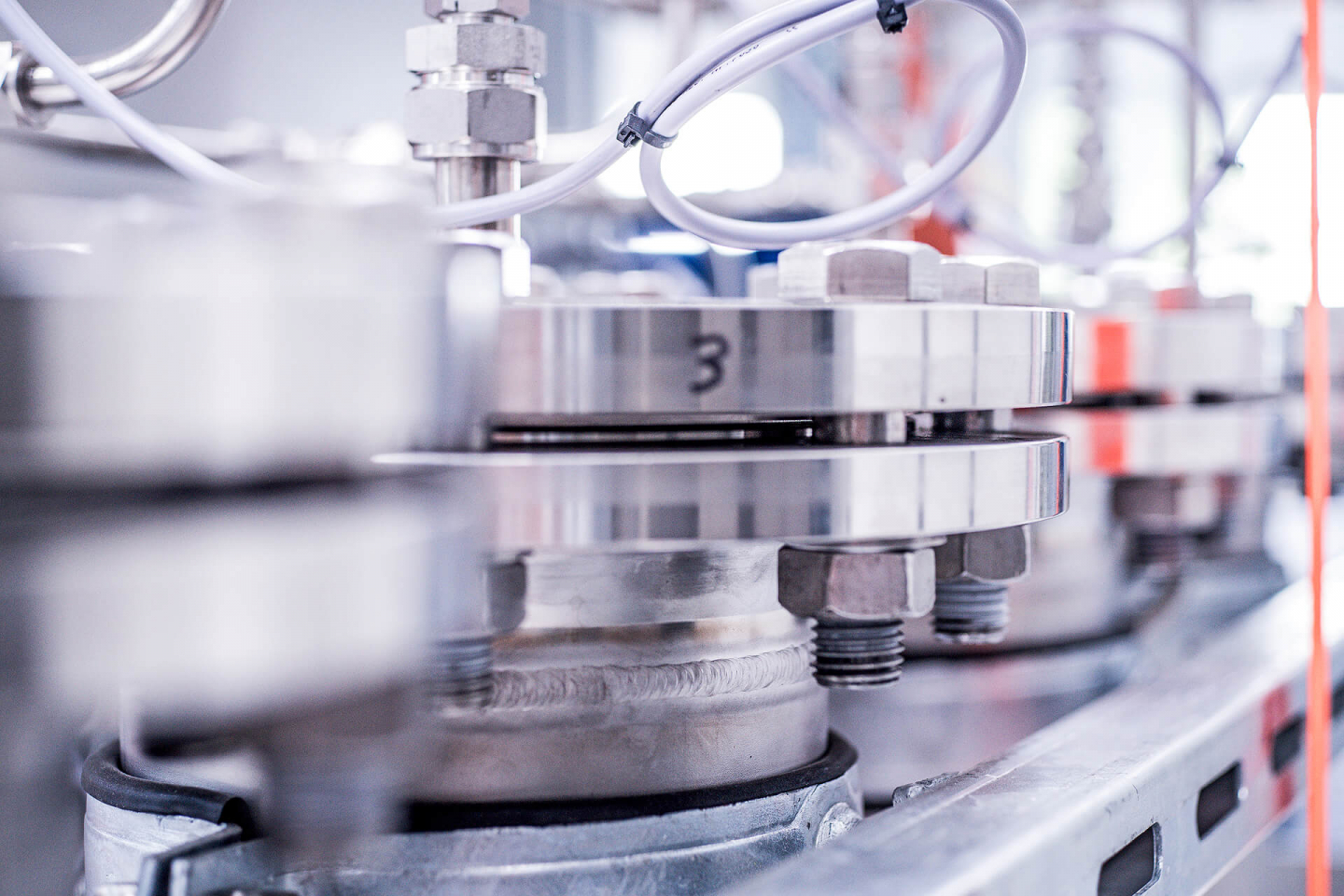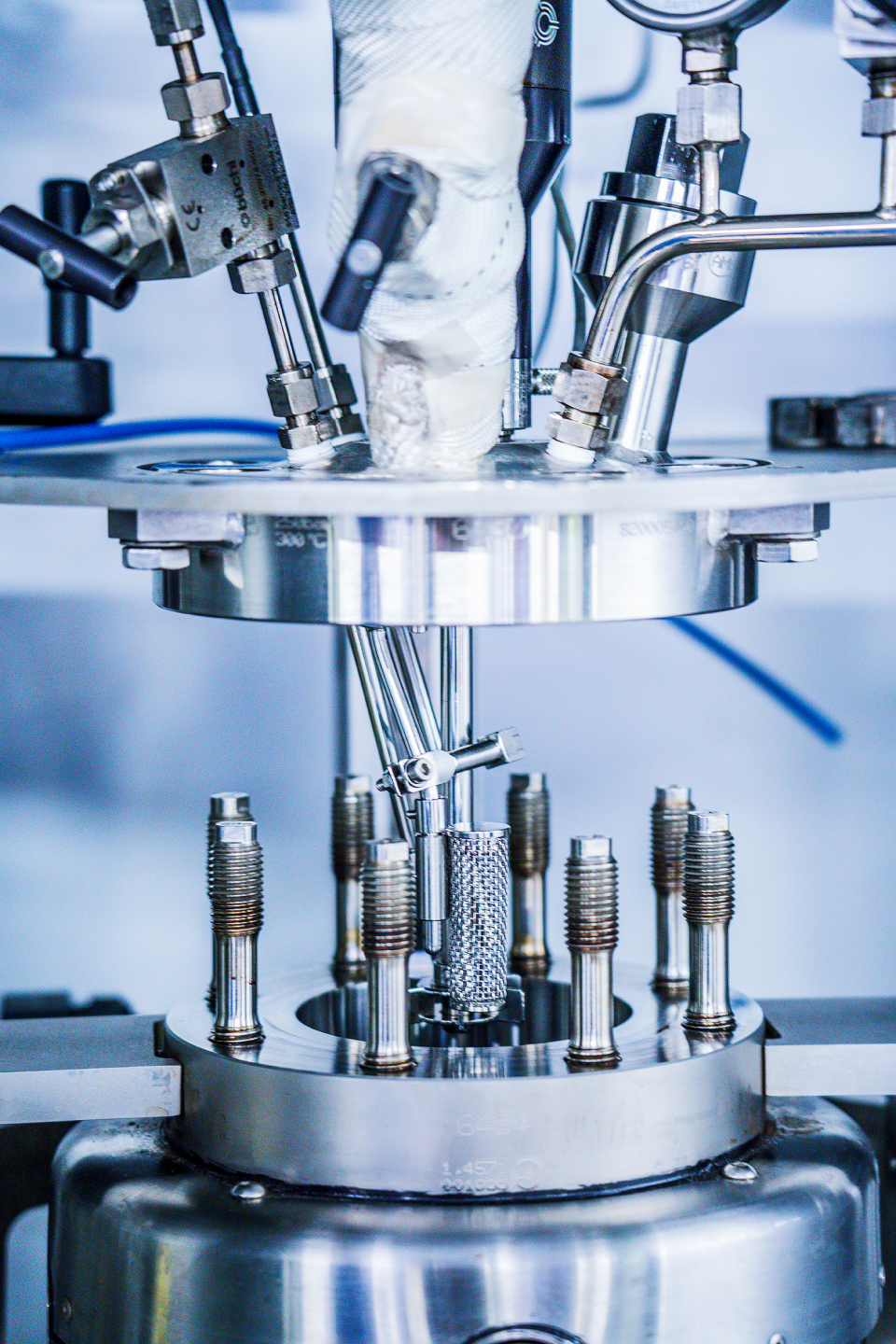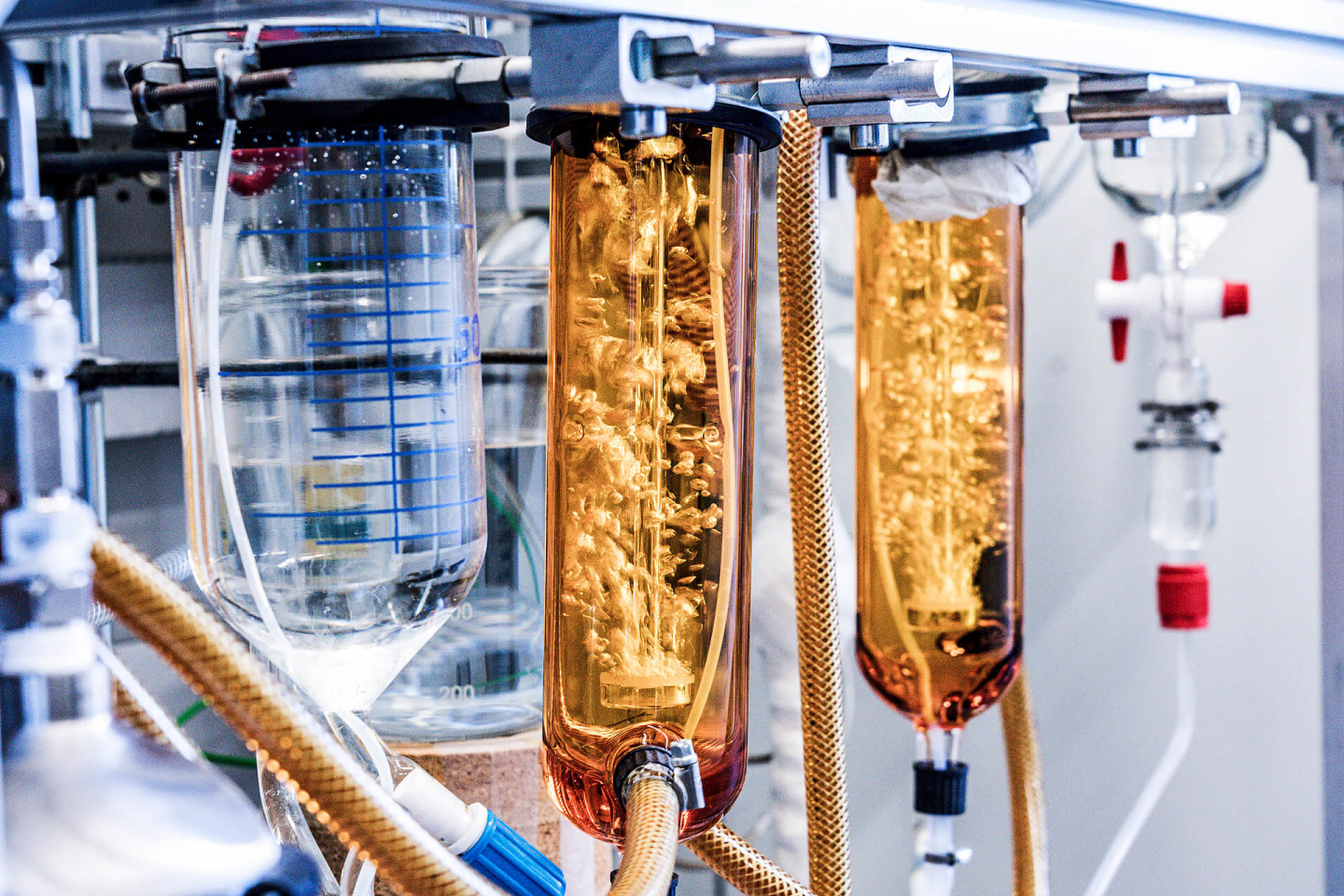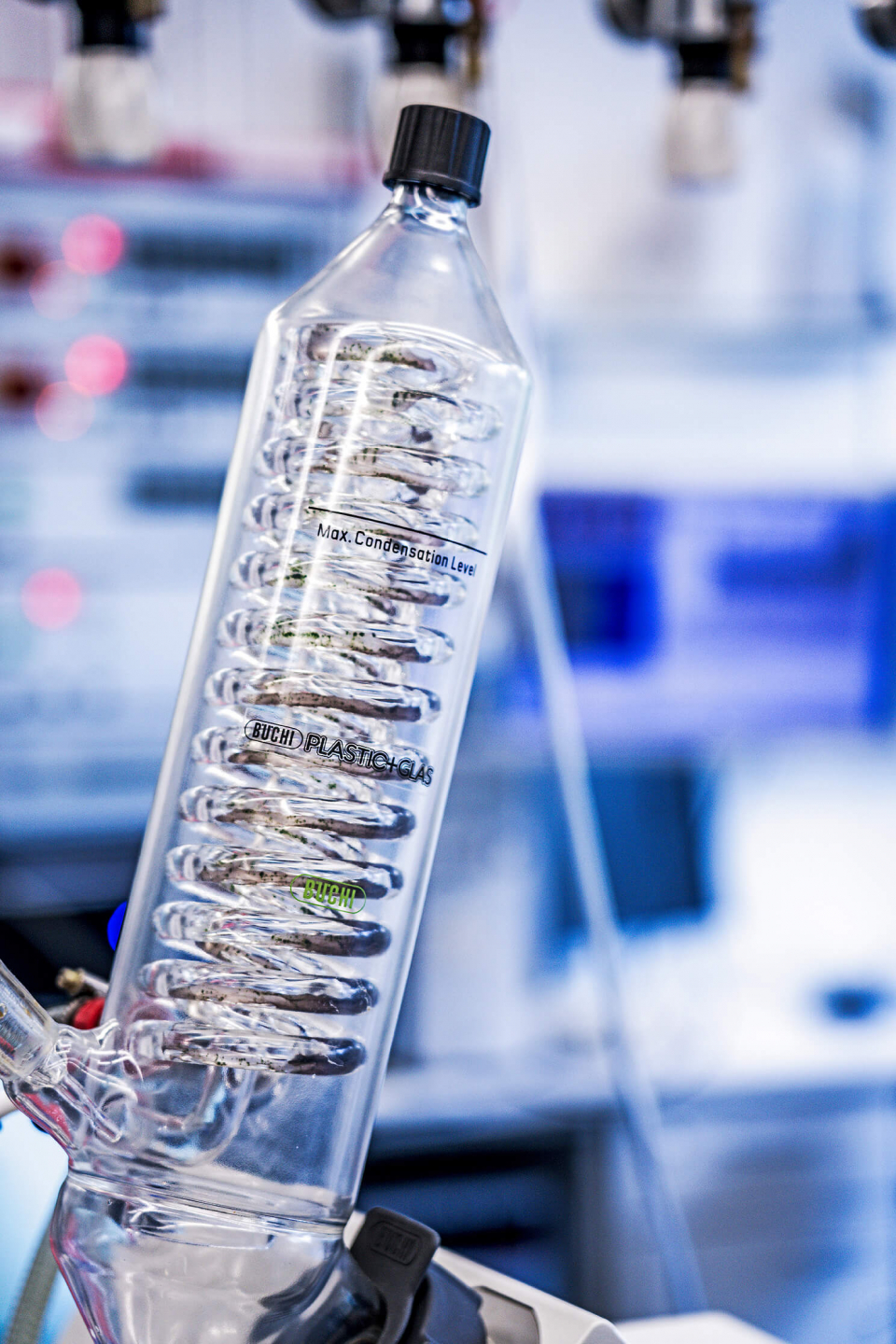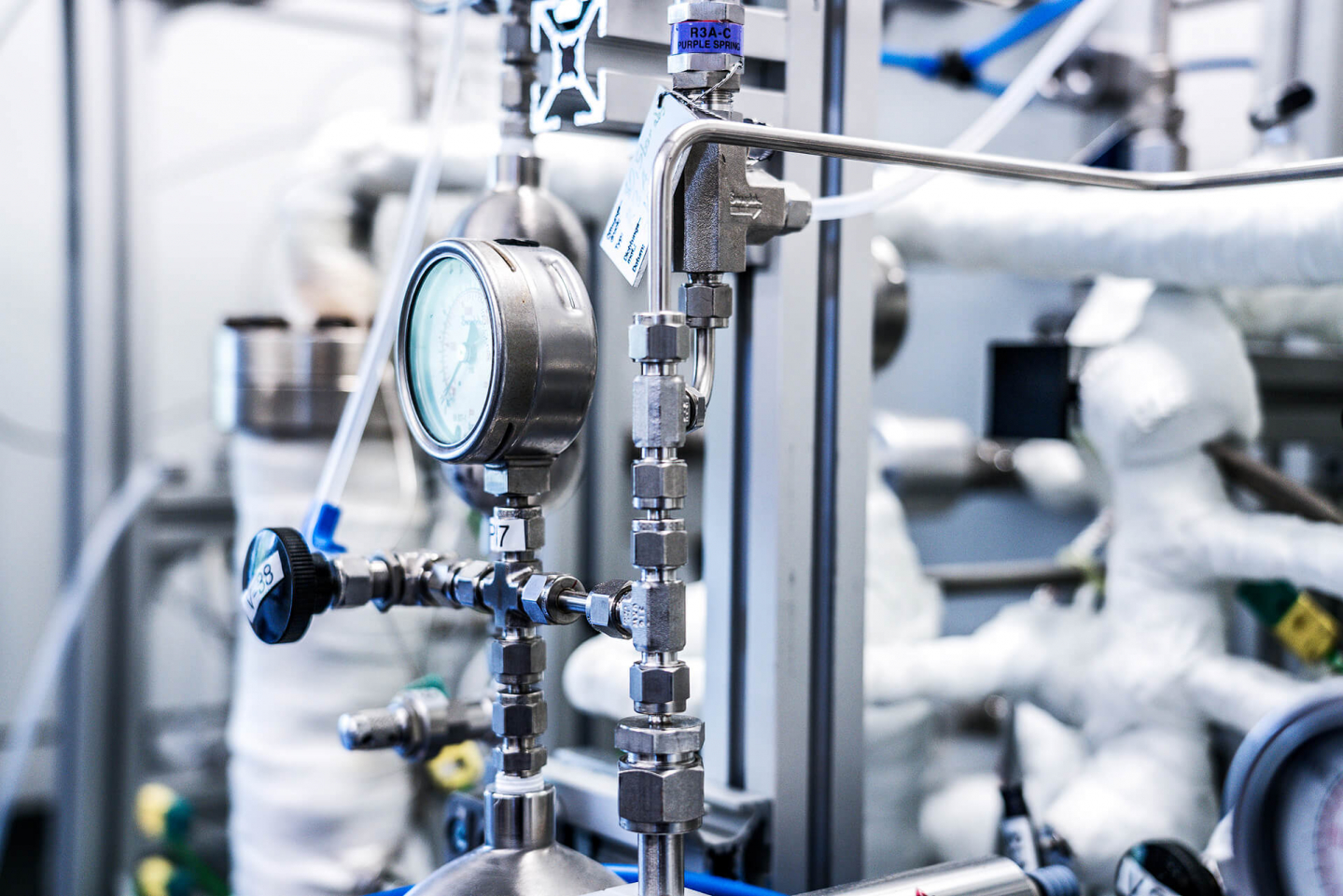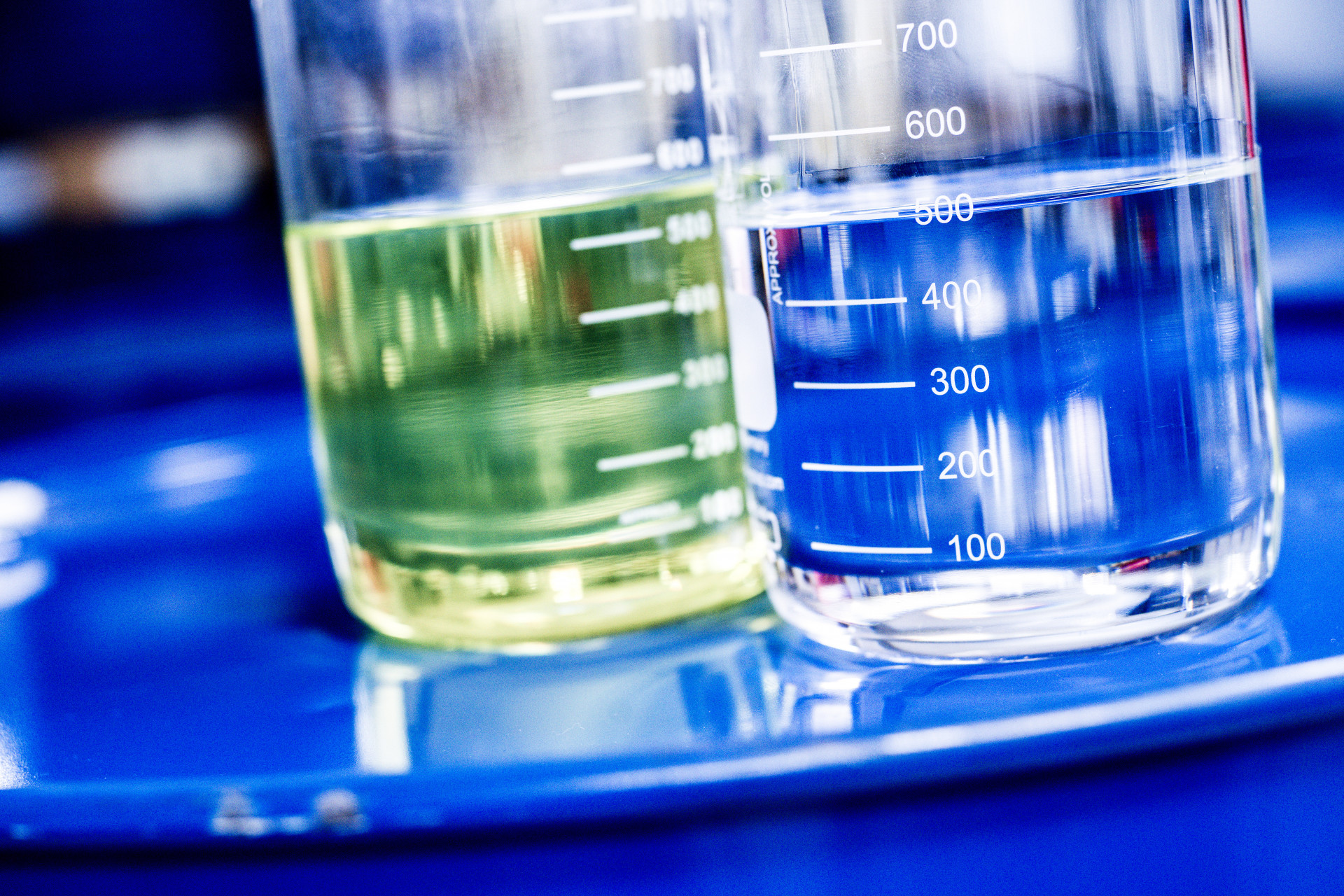
Nominee 2018
Flüssige Wasserstoffspeicher
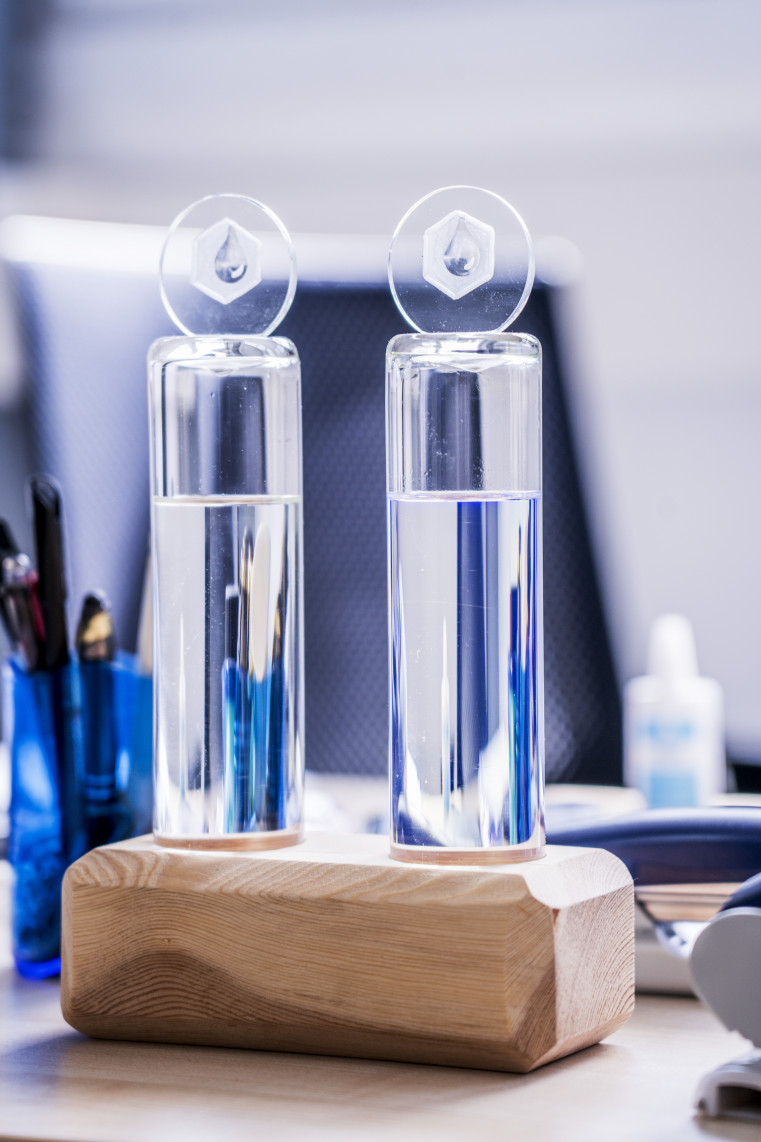
Prof. Dr. rer. nat. Peter Wasserscheid, Prof. i. R. Dr.-Ing. Wolfgang Arlt and Dr.-Ing. Daniel Teichmann have discovered a simple and convincing solution. With their discovery, the three nominated scientists have opened the door to a sustainable energy economy based on hydrogen. They came up with a new concept to bind hydrogen safely and inexpensively to an easy-to-handle liquid - and to recover it when needed. The carrier liquid serves as a "returnable bottle" for hydrogen and the energy stored in it.
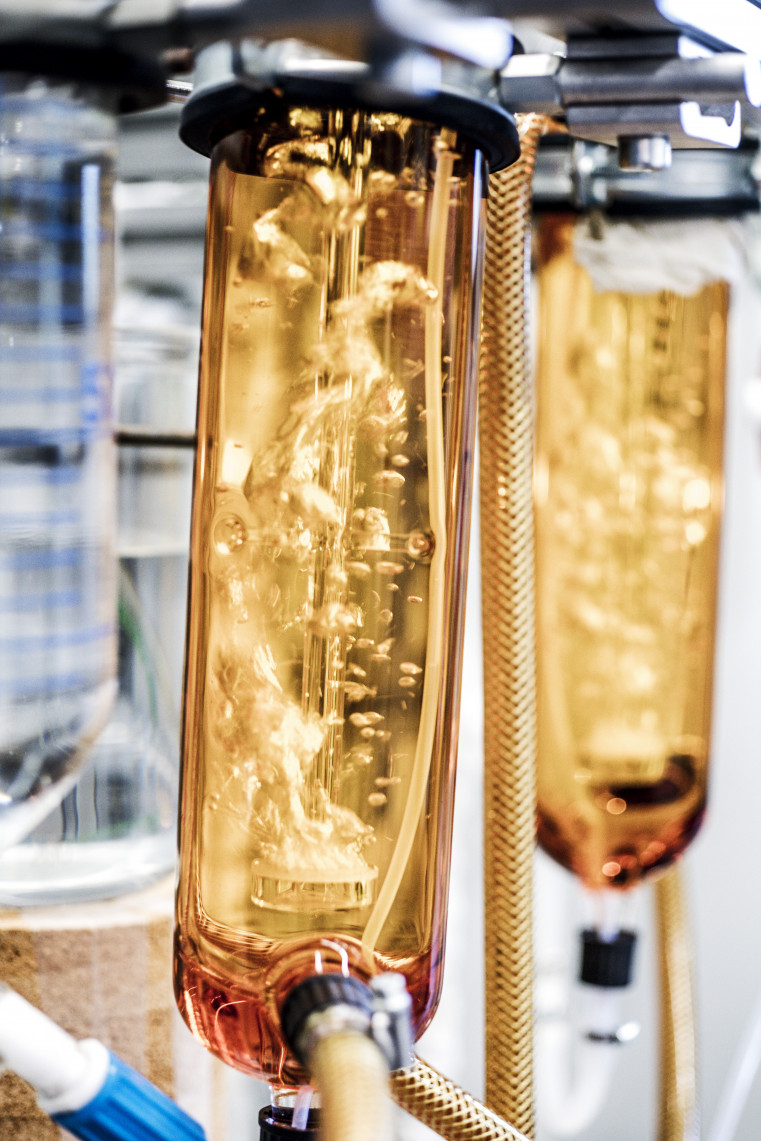
Peter Wasserscheid leitet den Lehrstuhl für Chemische Reaktionstechnik der Friedrich-Alexander-Universität Erlangen-Nürnberg und ist Direktor am Helmholtz-Institut Erlangen-Nürnberg für Erneuerbare Energien, einer Außenstelle des Forschungszentrums Jülich. Wolfgang Arlt war Inhaber des Lehrstuhls für Thermische Verfahrenstechnik der Universität Erlangen-Nürnberg und Gründungsdirektor des Energie Campus Nürnberg. Daniel Teichmann ist Geschäftsführer und Hauptgesellschafter der Hydrogenious Technologies GmbH, die er gemeinsam mit Peter Wasserscheid und Wolfgang Arlt gegründet hat.
more details
Resumes
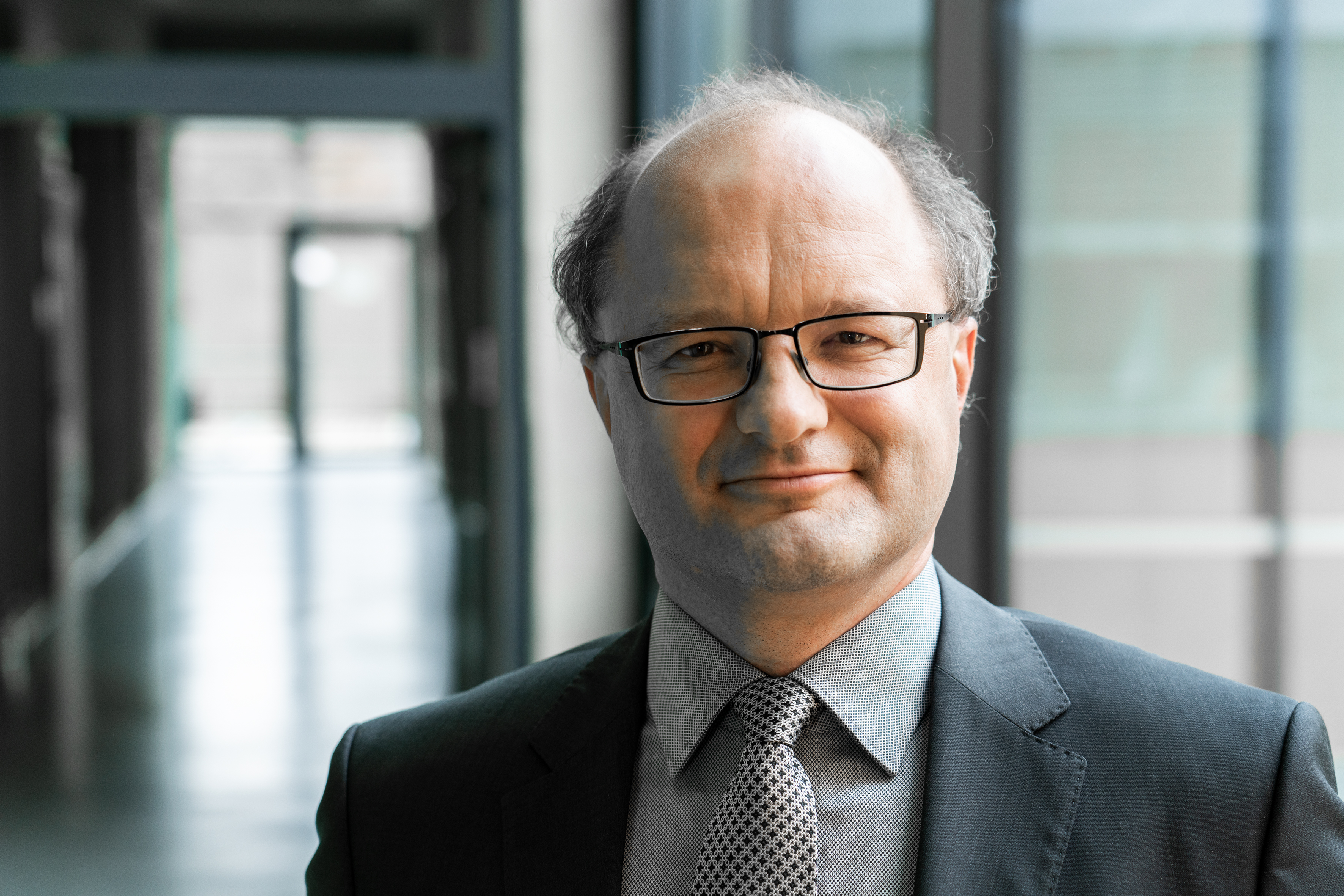
Prof. Dr. rer. nat. Peter Wasserscheid
- Oct. 23, 1970
- Born in Würzburg, Germany
- 1981 - 1990
- Kaiser-Heinrich-Gymnasium, Bamberg
- 1990 - 1991
- Deutsch-Französische Brigade, Böblingen
- 1991 - 1995
- Studies in Chemistry at the RWTH Aachen University
- 1995 - 1998
- PhD thesis at the Institute for Technical Chemistry and Petroleum Chemistry of the RWTH Aachen, supervisor: Prof. Dr. W. Keim
- 1998
- Industrial postdoc at BP Chemicals Sunbury/Great Britain
- 1998 - 2003
- Habilitation at the Institute for Technical Chemistry and Macromolecular Chemistry of RWTH Aachen
- 1999 - 2007
- Founder and shareholder of Solvent Innovation GmbH, Cologne – sold in 2007 to Merck KGaA, Darmstadt
- since 9/2003
- C4/W3-Professor at the Institute for Chemical Reaction Engineering at Friedrich-Alexander University Erlangen-Nuremberg (successor of Prof. G. Emig)
- 2003 - 2005
- Vice-chairman of the Department for Chemical and Biological Engineering of Friedrich-Alexander University Erlangen-Nuremberg
- 2005 - 2010
- Chairman of the Department for Chemical and Biological Engineering of Friedrich-Alexander University Erlangen-Nuremberg
- 7/2009
- Offer to take a Full Professor position for Chemical Reaction Engineering at EPFL Lausanne, Switzerland – offer declined
- since 2010
- Vice-chairman of the Department for Chemical and Biological Engineering of Friedrich-Alexander University Erlangen-Nuremberg
- 2013
- Founder and shareholder of Hydrogenious Technologies GmbH, Erlangen
- since 2014
- Secondary employment: Founding director of the Helmholtz-Institute Erlangen-Nuremberg for Renewable Energy (HI ERN) and Director of the Institute for Energy and Climate Research 11 of Forschungszentrum Julich
Other activities
- since 1998
- Referee for numerous scientific journals (e. g. Nature, Angewandte Chemie, ChemSusChem etc.) and for numerous national and international funding agencies
- since 2003
- Contact professor of the Bavarian Elite Academy
- since 2005
- Spokesman of the DECHEMA-working group Advanced Fluids
- since 2005
- Member of the coordination board of the elite study course Advanced Materials and Processes of Friedrich-Alexander University Erlangen-Nuremberg
- 2006 - 2013
- Initiator and coordinator of the DFG Priority Program Ionic Liquids
- 2008 - 2016
- DFG Review Board Member
- since 2007
- Vice-coordinator of the Cluster of Excellence Engineering of Advanced Materials
Publications & Patents
- More than 370 publications in peer-reviewed, international journals
(Co-)inventor of 98 patent applications and granted patents
3 books
Honors & Awards
- 1989
- 3. Prize in Bavaria in the Jugend forscht competition in Chemistry, Topic: Polymers with electric conductivity
- 1990
- 1. Prize in Germany in the Jugend forscht competition in Environmental Science: “Natural polymer-matrix compounds – a new application for lignin from the Organosolv process”
- 1990
- 1. Prize in the competition European Youth Environmental Research
- 1990-1995
- Fellow of the Bavarian foundation for highly gifted students
- 1990-1995
- Fellow of the Studienstiftung des deutschen Volkes
- 1996
- Springorum medal of RWTH Aachen for a master degree with distinction
- 1996
- Friedrich-Wilhelm Prize of RWTH Aachen for excellent scientific achievements during the master thesis
- 1996
- DECHEMA student award for efficient studies in Technical Chemistry
- 1999
- Borchers medal of RWTH Aachen for a PhD degree with distinction
- 2000
- 4. Prize in the German start-up competition Science4Life of the Hessian State Government (with Solvent Innovation GmbH, Cologne).
- 2000
- Haltermann Innovation Award (1. Prize) of the Haltermann Ascot GmbH, Hamburg
- 2000
- Carl-Zerbe Award of DGMK for “excellent contributions to the field of applying ionic liquids as catalysts and for catalyst separation”
- 2001
- DECHEMA Junior Professors Award in Technical Chemistry
- 2001
- DECHEMA Award of the Max-Buchner foundation for “ground-breaking contributions for the application of ionic liquids in Technical Chemistry and Biotechnology”
- 2003
- Innovation Award of the German Economy, category start-up, with Solvent Innovation GmbH, Cologne
- 2006
- Gottfried-Wilhelm-Leibniz-Prize of the German Science Foundation
- 2006
- Nominated for the Degussa European Science-to-Business Award 2006 (prize money: 100.000 €) jointly with Dr. Anders Riisager, DTU, Lyngby, Dänemark
- 2010
- ERC Advanced Investigator Grant: Engineering of Supported Molten Salt Catalysts for Dehydrogenation Reactions and Hydrogen Production Technologies
- 2013
- Honorary Professor at the Institute for Process Engineering, Chinese Academy of Science, Beijing, China.
- 2014
- Bavarian Founder Award with Hydrogenious Technologies GmbH, Erlangen
- 2014 1. Prize in the German start-up competition Science4Life of the Hessian State Government (with Hydrogenious GmbH, Erlangen).
- 2016 CATSA Eminent Visitor Award of the South African Catalysis Society
- 2016 Innovation Award of the German Economy, category start-up; with Hydrogenious Technologies GmbH, Erlangen
- 2018 ERC Advanced Investigator Grant: Supported Catalytically Active Liquid Metal Solutions
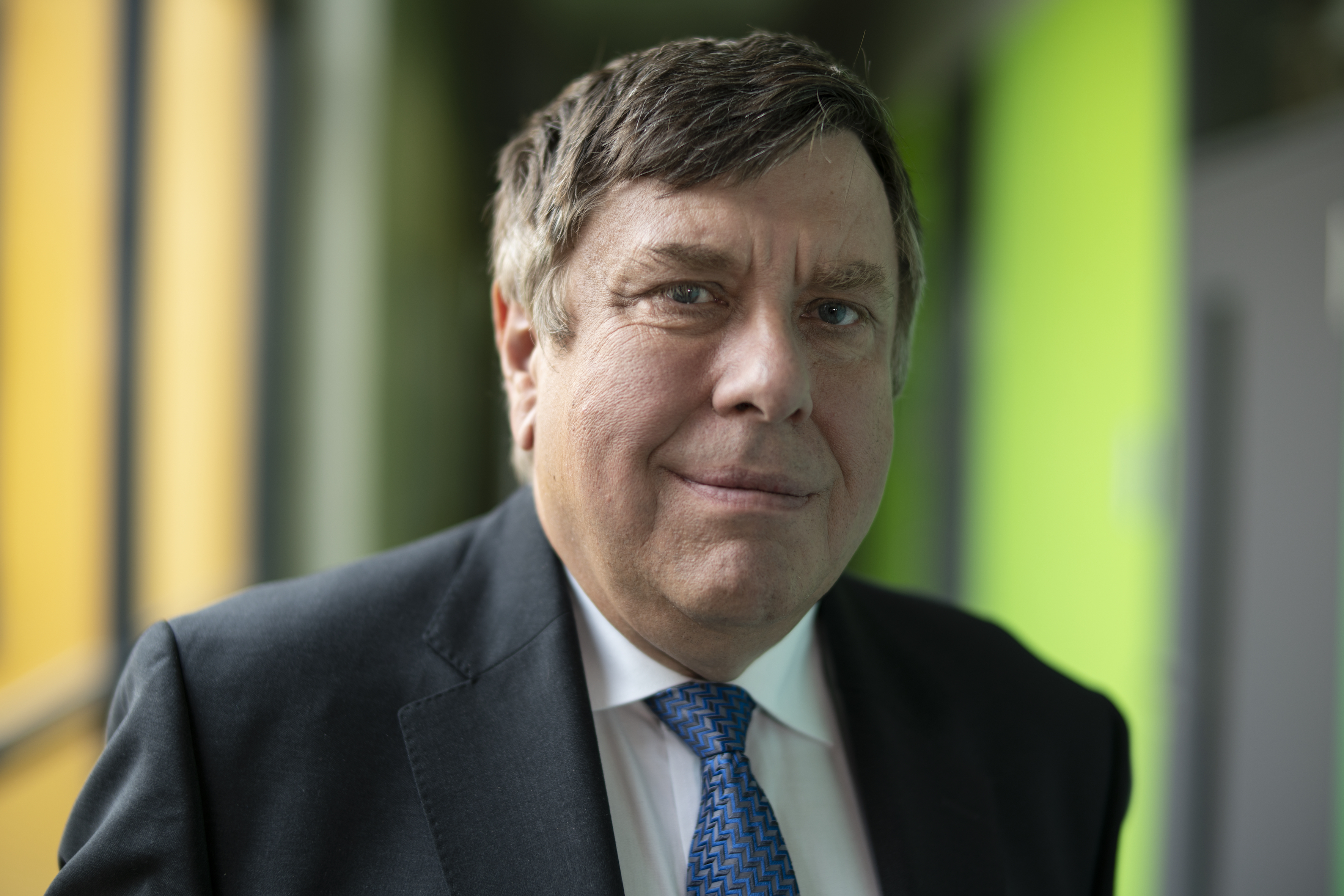
Prof. i. R. Dr.-Ing. Wolfgang Arlt
- May 21, 1952
- Born in Bochum, NRW, Germany
- 1970
- High school leaving examination (Abitur) at Goethe high school, Bochum
- 1970 - 1976
- Study of chemistry with focus on physical chemistry at University of Dortmund
- 1976 - 1981
- PhD in Chemical Engineering of Dortmund University with the mark “Summa cum laude” (A+)
- 1981 - 1992
- Chemical engineer at Bayer AG (Germany) at the locations Leverkusen, Antwerp and Krefeld; in Krefeld plant manager of a polymer production
- 1992 - 2004
- Professorship at TU Berlin for “Thermodynamics and Separation Science”
- 1992 - 1996
- Chairman of the national Dechema working party “engineering data”
- 1996 - 2002
- Chairman of the national GVC working party “Fluid Separations”
- 1998
- Job offer by Dresden university: refused
- 2000 - 2003
- Chairman of the Dechema working party “Liquid Chromatography”
- 2004 - 2018
- Professor and chair of the chair “Separation Science&Technology” and chairman of the high-pressure lab of Erlangen university
- 2010 - 2017
- Founder and first chairman of Energy Campus Nuremberg
- 2013
- Co-Founder of Hydrogenious Technologies GmbH, Erlangen, Germany
- 1.4.2018
- retirement
Publications & Patents
- More than 200 publications in peer-reviewed journals and 70 patent applications. Prof. Arlt received the highest earnings for the purchase of a patent group in the history of TU Berlin. The focus of the patents was the recycling of the polymers in the so-called Yellow Bag of the German plastic packing recycling system.
Honours & Awards
- 9/2018
- Emil-Kirschbaum medal for separation science
A special award is that eight of Prof. Arlt’s scholars became professors in Germany and worldwide.
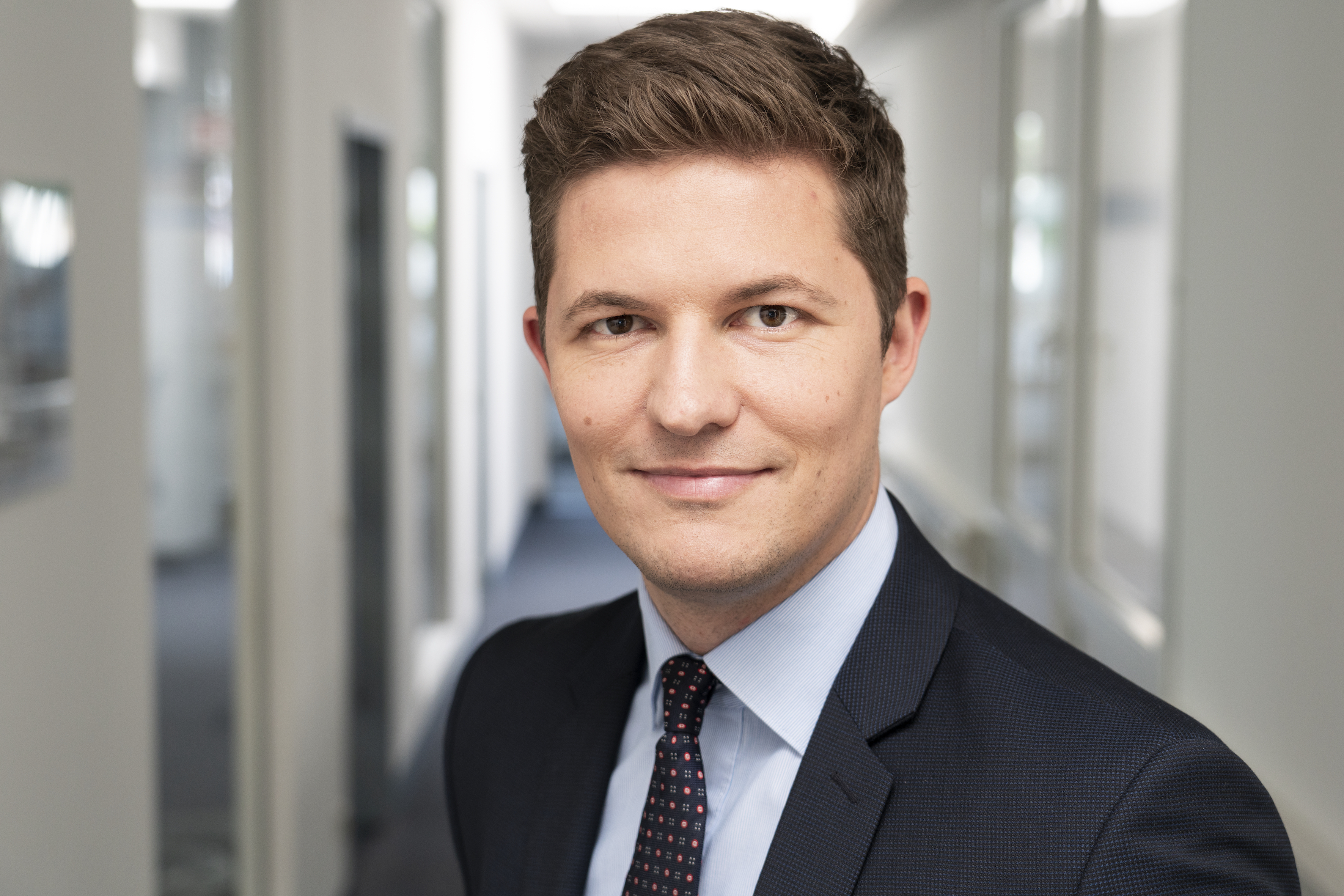
Dr.-Ing. Daniel Teichmann
- Feb. 23, 1983
- Born in Würzburg, Germany
- 2002
- Upper secondary school (“Abitur”) Kaiser-Heinrich-Gymnasium Bamberg, Germany
- 2002 - 2003
- Basic military service, technical maintenance at bomber squadron 32, Lagerlechfeld Germany
- 2003 - 2009
- Diploma study program in engineering and economics, Friedrich-Alexander-University, Erlangen-Nuremberg, Germany
- 2005 - 2010
- Founder and CEO of „Kopiermanie GbR“, personnel services provider, Erlangen
- 2006 - 2007
- Additional study as scholar at the Bavarian Elite Academy - an institution of the state of Bavaria, Munich, Germany
- 2007
- Overseas internship at Leonie AG in Changzhou, PR China
- 2008
- Summer Internship at McKinsey&Company, London, Great Britain
- 2009
- Graduation (Diploma thesis) at FMP Technology GmbH, Erlangen, Germany
- 2009 - 2012
- Development engineer at BMW AG Research and Technology in the department „Efficient Dynamics Engine Research“, Munich, Germany
- 2009 - 2014
- Dissertation at Friedrich-Alexander-University Erlangen-Nuremberg, Germany, Graduation with „summa cum laude“
Supervisor: Prof. Dr Wolfgang Arlt, Prof. Dr Peter Wasserscheid
Topic: „Konzeption und Bewertung eines nachhaltigen Energiesystems auf Basis flüssiger Wasserstoffträger (LOHC)“ (Conception and assessment of a sustainable energy system based on Liquid Organic Hydrogen Carriers (LOHC)) - 2012 - 2014
- CEO of „Bavarian Hydrogen Center“, government-funded research institution, amount of funding: 15 Mio. EUR over 5 years, Erlangen, Germany
- since 2013
- Founder and CEO of „Hydrogenious Technologies GmbH“, Erlangen, Germany
Other activities
- 1997 - 2007
- Basketball player, i. a. regional leagues southern germany
- 2003 - 2005
- Leader of the work group „Studenten und Jungingenieure Erlangen“ (Students and young engineers Erlangen) of the „Verein Deutscher Ingenieure (VDI)“ (Association of German Engineers)
- 2010 - 2015
- Chairman of the Alumni Association of the Bavarian Elite Academy
- 2010 - 2011
- Elected spokesman of the PhD student committee at BMW Group
- since 2014
- Member of the advisory board (“Kuratorium”) of the Bavarian Elite Academy
- since 2015
- Function as jury member and mentor for the Bavarian Elite Academy
Publications & Patents
- 9 international publications, like:
„A future energy supply based on LOHC“ in „Energy & Environmental Science“, 2011, 4, 2767-2773, lead author, 152 citations (Date 7/2018)
“Energy storage in residential and commercial buildings via Liquid Organic Hydrogen Carriers (LOHC)” in “Energy & Environmental Science”, 2012, 5, 9044-9054, lead author, 70 citations (Date 7/2018)
“Liquid Organic Hydrogen Carriers as an efficient vector for the storage and transport of renewable energy” in “International Journal of Hydrogen Energy”, Volume 37, Issue 23, December 2012, Pages 18118-18132, lead author, 108 citations (Date 7/2018)
Dissertation: „Konzeption und Bewertung eines nachhaltigen Energiesystems auf Basis flüssiger Wasserstoffträger“, Shaker Verlag, ISBN-13: 978-3844033229
17 national and international patent applications
Honours & Awards
- 2005
- Winner: 5-Euro-Business-competition of the “Bildungswerk der bayerischen Wirtschaft” (start-up competition) with the company „kopiermanie“
- 2005
- Scholarship: admittance to the “Stiftung der Deutschen Wirtschaft” (Scholarship foundation of the German Industry)
- 2006
- Scholarship: admittance to the Bavarian Elite Academy
- 2007
- Scholarship: admittance to the “Studienstiftung des Deutschen Volkes” (German Academic Scholarship Foundation)
- 2007
- Scholarship: admittance to the Leonardo-college of the Friedrich-Alexander-University Erlangen-Nuremberg
- 2010
- Finalist: „SCIentrepreneur Innovation Check“ with the contribution „Flüssige Wasserstoffträger (LOHC)“ (Liquid Organic Hydrogen Carriers (LOHC))
- 2013
- Winner: ”Hochschulgründerpreis” (University founders award) in the „Businessplan contest North Bavaria” with Hydrogenious Technologies
- 2014
- Winner: “Bayerischer Gründerpreis” (Bavarian Founders Award) in the category „Concept“ with Hydrogenious Technologies
- 2014
- Winner: Nationwide „Science4Life Venture Cup 2014“ with Hydrogenious Technologies
- 2015
- Finalist: “Next Economy Award” with Hydrogenious Technologies
- 2016
- Winner: “Innovationspreis der Deutschen Wirtschaft” (German Industry Innovation Award) in the category Startup with Hydrogenious Technologies
- 2016
- Winner: “Step” Award in the categories „Technology“ and “special award sustainability” with Hydrogenious Technologies
- 2016
- Winner: GP Bullhound Connect Award in the category „Ones to watch“ with Hydrogenious Technologies
- 2017
- Winner: “Start up Energy transition award” in the category “Cleantech against climate change” of the German Energy Agency (dena) with Hydrogenious Technologies
- 2017
- Winner: Founders award of the Chamber of Industry and Commerce (IHK) Middle Franconia
- 2018
- Winner: Honoured as a „Global Cleantech 100“ company with Hydrogenious Technologies
Contact
Spokesperson
Prof. Dr. Peter Wasserscheid
Lehrstuhl für Chemische Reaktionstechnik
Institut für Chemie- und Bioingenieurwesen
Friedrich-Alexander-Universität Erlangen-Nürnberg
Egerlandstraße 3
91058 Erlangen
Phone: +49 (0) 9131 / 85 27 420
E-Mail: peter.wasserscheid@fau.de
Press
Hydrogenious Technologies GmbH
Herr Marko Lederer
Weidenweg 13
91058 Erlangen
Phone: +49 (0) 9131 / 12 64 02 38
Fax: +49 (0) 9131 / 12 64 029
E-Mail: marko.lederer@hydrogenious.net
www.hydrogenious.net
Friedrich-Alexander-Universität Erlangen-Nürnberg
Blandina Mangelkramer
Schlossplatz 4
91054 Erlangen
Phone: +49 (0) 9131 / 85 70 229
Fax: +49 (0) 9131 / 85 70 220
presse@fau.de
www.fau.de
A description provided by the institutes and companies regarding their nominated projects
When considering a CO2 free energy system of the future, the option of using hydrogen as a source of energy is almost invariably cited. In terms of its weight, as the lightest known chemical element, hydrogen carries significantly more energy than petrol: one kilogramme of hydrogen contains almost as much energy as three kilogrammes of the fossil fuel. Hydrogen can be converted to electrical energy in a fuel cell, enabling it to be used as fuel in the mobility sector and other areas of the energy industry. If the hydrogen which is used is obtained by decomposing water using solar or wind power, an energy system is created that works without producing CO2 or any other harmful emissions.
Hydrogen vehicles are already becoming more readily available and are increasingly able to travel distances close to those reached by vehicles which run on either petrol or diesel. With refuelling times similar to those needed at a conventional petrol station, hydrogen refuelling is particularly suitable for long distances and larger vehicles, including buses, lorries, ships and trains. As the consequences of climate change become more apparent and heavy air pollution is proving a problem in many densely populated regions of the world, efforts have been made across the globe to make the transport sector more sustainable and free of hazardous substances. In this context, hydrogen has become a major focus of attention in public debate in recent years. Major corporations such as Toyota, Daimler, Hyundai, Audi, Engie, Alstom and Shell are making a position for themselves in this growth market.
However, despite all the progress which has been made so far, storing and handling hydrogen safely and cost-effectively still poses a challenge. The problem is that the volume-related energy density of hydrogen gas is very low under ambient conditions. For hydrogen to be stored and transported, technical measures have to be used to increase its density. At present, hydrogen is generally placed under very high pressure of up to 700 bar or liquefied at temperatures of under -250°C. Both processes are complex and expensive, especially since an entirely new infrastructure would have to be built across the board for this type of treatment. If hydrogen is to be used in future as an energy source in place of fossil fuels, a way must be found to integrate its storage and transport efficiently and safely into the existing infrastructure.
With this vision of a hydrogen-based sustainable energy system in mind, Prof. Dr. Peter Wasserscheid from FAU and Helmholtz Institute Erlangen-Nürnberg for Renewable Energy, part of Forschungszentrum Jülich, Prof. Dr. Wolfgang Arlt from FAU and Dr. Daniel Teichmann, managing director of Hydrogenious Technologies GmbH, have developed a way to fully exploit hydrogen avoiding the complicated handling of molecular hydrogen. Instead, hydrogen is chemically bound to a safe and easy-to-handle carrier liquid that can be safely used in the existing infrastructure of today's fuels. The hydrogen is released as necessary, leaving behind the carrier liquid which acts as a 'liquid refillable bottle' and can be refilled as required. The so-called LOHC (liquid organic hydrogen carrier) technology offers a simple and efficient method for storing and transporting hydrogen.
The advantages of this hydrogen storage technology are manifold: Since the carrier liquid can be handled like conventional fuel, there is no need to change the existing infrastructure already used on tank vessels, fuel tankers and petrol stations. The high storage density also enables the hydrogen to be transported efficiently over long distances and stored for extended periods of time without losses. As a result, it is possible for large hydrogen refuelling stations to be supplied with renewably generated hydrogen at a relatively low cost. The carrier liquid which is used is not classed as a hazardous substance, it is not toxic, slow to ignite, non-explosive and therefore greatly superior to both today's fuels and gaseous hydrogen in terms of safety. The nominated team has significantly advanced LOHC technology in recent years, in particular by introducing a new concept and developing the necessary catalysts, equipment and processes.
In order to make the technology available to the market, Dr. Daniel Teichmann, Prof. Peter Wasserscheid, Prof. Wolfgang Arlt and Prof. Eberhard Schlücker founded the company Hydrogenious Technologies GmbH in 2013. Based in Erlangen, the company develops, builds and markets industrial LOHC systems, which are already being used successfully in several countries. In Tennessee, USA, for example, Hydrogenious and its partner United Hydrogen Group have recently successfully commissioned several plants that provide industrial customers with hydrogen in a particularly straightforward and cost-effective manner. In addition, plants are currently under construction for use at hydrogen refuelling stations supplied with LOHC, destined for use after completion in Erlangen, Finland and China, and the company is also working on concepts for using LOHC directly in ships, trains, lorries and buses as an emission-free fuel.
Hydrogenious Technologies has already won numerous awards, including the German Business Innovation Award, the Energy Transition Award of the German Energy Agency and the Bavarian Founder Award. The company now has 65 employees and is involved in projects in Europe, the USA and China. Hydrogenious Technologies works closely with a number of reputable companies including Clariant, Sasol, MAN and Anglo Platinum. Due to the great interest across the globe in hydrogen in general and LOHC technology in particular, Hydrogenious Technologies expects a significant rise in turnover in the coming years, as well as an increase in international activities and further growth in the number of employees. In terms of research there are still close links with Friedrich-Alexander-Universität Erlangen-Nürnberg and the Helmholtz-Institute Erlangen-Nürnberg for Renewable Energy. Researchers there are specifically working on realising, in the medium term, a feasible option to use the carrier liquid laden with hydrogen to create electric energy directly via a so-called 'direct LOHC fuel cell'.
The technology therefore has potential reaching far beyond merely supplying hydrogen refuelling stations or the hydrogen logistics industry. In future, LOHC technology is hoped to form the basis for a sustainable energy system. Hydrogen, safely stored in LOHC, will help to balance the fluctuating yield of renewable energy, which is dependent on weather and the time of day, to meet actual demand. An even more important factor is the global transport of renewable energy. Whilst many sparsely populated regions in the world offer the best conditions for constructing high-yield wind or solar power plants, it is the densely populated and highly industrialised regions where the power is needed. The LOHC technology developed by the nominees makes it possible for hydrogen to be transported efficiently across the globe, as well as allowing hydrogen to be saved without any loss and in a manner compatible with existing infrastructure for a global energy system of the future without any CO2 emissions.
About Hydrogenious Technologies GmbH
Hydrogenious Technologies GmbH was established in 2013 as a spin-off of Friedrich-Alexander-Universität Erlangen-Nürnberg with the aim of marketing the LOHC technology. Thanks to investments from Anglo American Platinum and partnerships with the companies Clariant, Sasol and MAN, Hydrogenious Technologies has a wealth of economic, strategic and financial resources at its disposal. The company, which is based in Erlangen, has 65 employees. Hydrogenious Technologies is a global pioneer in the field of hydrogen storage technologies based on liquid organic hydrogen carriers (LOHC) and builds plants for the hydrogen logistics industry and fuelling stations based on LOHC technology.
About FAU
Friedrich-Alexander-Universität Erlangen-Nürnberg (FAU), established in 1743, is one of the largest universities in Germany, with roughly 40,000 students, 580 professors and more than 14,000 members of staff. In the Reuters ranking of the 100 most innovative universities in Europe, FAU is currently in 5th place, ahead of well-known universities such as Oxford or Leiden. In addition to the Cluster of Excellence 'Engineering of Advanced Materials' (EAM) and the Graduate School of Advanced Optical Technologies (SAOT), which was founded as part of the Excellence Initiative, FAU currently has more than 40 coordinated programmes funded by the German Research Foundation (DFG).
FAU offers around 260 degree programmes, including Bavarian Elite Master's degree programmes and around 50 programmes with a distinct international focus. No other German university offers such a broad and interdisciplinary range of subjects on all qualification levels.
About Forschungszentrum Jülich
With approximately 5,900 employees, Forschungszentrum Jülich makes a valuable contribution to tackling major challenges faced by society in the areas of information, energy and bioeconomics. It focuses on the future of information technology and processing, complex processes in the human brain, the reform of the energy system and a sustainable bioeconomy. The research centre continues to develop simulation and data science as a key method of research, using large, often unique, scientific infrastructures. Its work spans a range of topics and disciplines, making use of the synergies between the various research areas.
The right to nominate outstanding achievements for the Deutscher Zukunftspreis is incumbent on leading German institutions in science and industry as well as foundations.
The project "Liquid hydrogen storage - paving the way for a future hydrogen society" was submitted by “Helmholtz-Gemeinschaft Deutscher Forschungszentren e. V.”.
German President Frank-Walter Steinmeier will award the 22st Deutscher Zukunftspreis for the year 2018 to one of the three nominated teams on November 28, 2018.
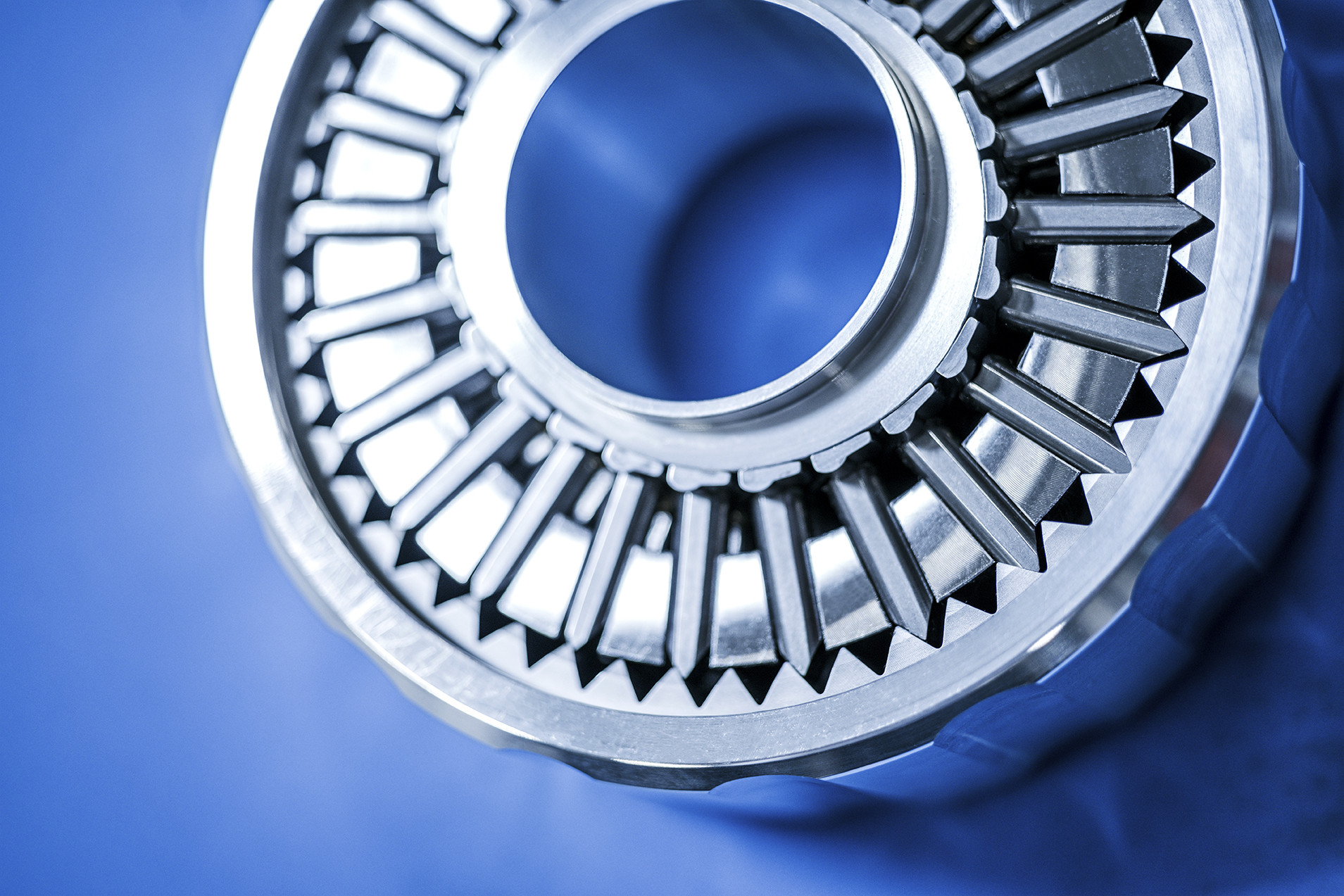

 Gebärdensprache
Gebärdensprache
 Leichte Sprache
Leichte Sprache


